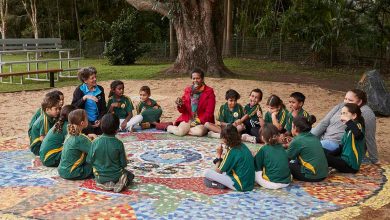Take a peek at Melbourne Girls’ College’s ‘fresh and spacious’ library refurb

Schools that have invested in redesigning and refurnishing their library spaces are reporting a growth in reading and the sudden popularity of the library as a social hub.
School News brings you library case study 2: Melbourne Girls’ College
Melbourne Girls’ College’s updated library has been transformed from ‘placid’ to ‘fresh’ after undergoing an extension and refurbishment.
A functional deck and extra rooms were added, modern new furniture purchased and plenty of thought put into the best choice of book shelving.
“The old library was really placid and a bit stale and it needed a revision and what we have now is quite fresh,” explains Sylvan Dorney, the school’s library leader.
“The girls love the new library, they love the space.”
From morning until afternoon when Sylvan closes the doors, the popular library is active with girls studying, reading, socialising or having quiet time.
While the library has always been a well-used space at the college (enrolment 1450), Sylvan says the students have more enthusiasm for the space.
“When you have a more spacious library it is a better place to study,” he says.
“When it’s more spacious, you can fit more people in. We have created an ambient study space and the girls use it right up until close.
“The library has always been a hub but now they love it even more.”
Sylvan worked with VE Furniture to select the modern furniture and appropriate colours to bring life to the larger library space.
The room is decorated with black shelving and a black carpet dotted with blue, pink and grey coloured tiles to complement – but not match – the school’s colours.
He says the uniquely shaped angular desks have been well received. The library also has a lounge area with comfortable seating that can be easily slid to different locations, a large island in the middle of the study area as well as sturdy furniture which he jokes is “prison-riot worthy” but necessary for longevity.
The lounge furniture is blue, grey and pink, also resembling but not matching the school colours of blue, maroon and green.
“The key thing for us is that everything is on wheels and moveable and flexible and we can create shifting spaces to suit our needs,” he says.
“For example the library might be used for staff development days, or classes or events.”
In a compliment to the library’s new look, Sylvan says teachers and students have commented on the new black shelving which enables better displays for books and can be wheeled to different spaces.
“The teachers have said they love the shelving and some of the girls have made comments which is so nice.”







